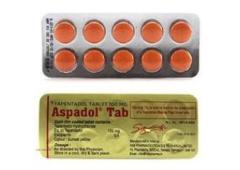Description
Aspadol, also known by its generic name Tapentadol, is a potent analgesic medication primarily used in the management of moderate to severe pain. It belongs to a class of drugs called opioid analgesics, which work by binding to specific receptors in the brain and spinal cord to reduce the sensation of pain. Aspadol is available in tablet form and is prescribed by healthcare professionals to patients suffering from various painful conditions. In this article, we delve into the details of Aspadol tablets, including their uses, dosage, side effects, and precautions.
Uses:
Aspadol tablets are prescribed for the treatment of acute as well as chronic pain conditions. Some common uses of Aspadol include:
Postoperative Pain: Aspadol is often used to manage pain following surgical procedures, providing relief to patients during their recovery period.
Chronic Pain Conditions: It is also indicated for chronic pain conditions such as diabetic neuropathy (nerve damage caused by diabetes), osteoarthritis (a type of joint disease), and lower back pain.
Neuropathic Pain: Aspadol may be prescribed for neuropathic pain, which originates from damage to the nerves and can be caused by conditions like multiple sclerosis or shingles.
Dosage:
The dosage of Aspadol tablets varies depending on the severity of the pain, the patient's medical condition, and their response to treatment. It is essential to follow the prescribing physician's instructions carefully. Typically, the initial dose for adults is 50 to 100 milligrams (mg) orally every 4 to 6 hours as needed for pain relief. The maximum recommended dose is 700 mg per day.
For elderly patients or those with impaired kidney or liver function, lower doses may be prescribed to reduce the risk of adverse effects. Dosage adjustments may also be necessary for patients switching from other opioid medications to Aspadol.
Side Effects:
While Aspadol can be effective in managing pain, it may also cause certain side effects. Common side effects of Aspadol tablets include:
Nausea and Vomiting: These gastrointestinal symptoms are among the most frequently reported side effects of Aspadol.
Dizziness and Drowsiness: Aspadol can cause central nervous system depression, leading to dizziness and drowsiness, which may impair the patient's ability to perform tasks requiring mental alertness, such as driving or operating machinery.
Constipation: Opioid medications like Aspadol often cause constipation, which can be managed with dietary changes, increased fluid intake, and the use of laxatives if necessary.
Headache: Some patients may experience headaches as a side effect of Aspadol treatment.
Respiratory Depression: In high doses or in susceptible individuals, Aspadol can cause respiratory depression, which is a potentially serious side effect characterized by slow or shallow breathing.
Precautions:
Before taking Aspadol tablets, patients should inform their healthcare provider about any existing medical conditions, allergies, or medications they are taking, including prescription drugs, over-the-counter medicines, and herbal supplements. It is particularly important to disclose any history of substance abuse or addiction.
Aspadol should be used with caution in certain populations, including:
Pregnant or Nursing Women: Aspadol may pass into breast milk and harm nursing infants. Pregnant women should only use Aspadol if the potential benefits outweigh the risks.
Elderly Patients: Older adults may be more sensitive to the effects of Aspadol and may require lower doses to prevent adverse reactions.
Patients with Respiratory Conditions: Aspadol should be used cautiously in patients with respiratory conditions such as asthma or chronic obstructive pulmonary disease (COPD) due to the risk of respiratory depression.
Patients with Liver or Kidney Impairment: Dose adjustments may be necessary in patients with impaired liver or kidney function to prevent the accumulation of Aspadol and its metabolites.
Conclusion:
Aspadol tablets are a valuable therapeutic option for the management of moderate to severe pain. When used appropriately under the guidance of a healthcare professional, Aspadol can provide effective pain relief and improve the quality of life for patients suffering from various painful conditions. However, it is essential to use Aspadol cautiously, adhere to prescribed dosages, and be vigilant for potential side effects. Patients should always consult their healthcare provider for personalized medical advice and treatment recommendations.






You must log in or register a new account in order to contact the publisher
Useful information
- Avoid scams by acting locally or paying with PayPal
- Never pay with Western Union, Moneygram or other anonymous payment services
- Don't buy or sell outside of your country. Don't accept cashier cheques from outside your country
- This site is never involved in any transaction, and does not handle payments, shipping, guarantee transactions, provide escrow services, or offer "buyer protection" or "seller certification"







